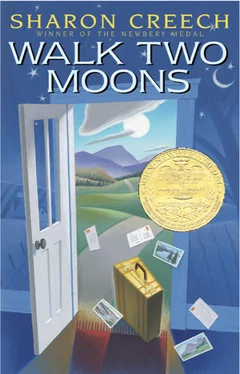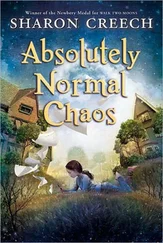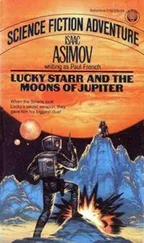“Blood?” Prudence said. She stopped eating.
Phoebe pulled out the envelope and emptied the hair strands on the table. “Strange hairs,” Phoebe explained.
Prudence said, “Uck.”
Mr. Winterbottom tapped his fork against his knife. Then he stood up, took Phoebe’s arm, and said, “Follow me.” He went to the refrigerator, opened the freezer compartment, and indicated the plastic containers. “If your mother had been kidnapped by a lunatic, would she have had time to prepare all these meals? Would she have been able to say, ‘Excuse me, Mr. Lunatic, while I prepare ten or twenty meals for my family to eat while I am kidnapped?’”
“You don’t care,” Phoebe said. “Nobody cares. Everyone has his own idiot agenda.”
I left shortly after dinner. Mr. Winterbottom was in his study, phoning his wife’s friends to see if they had any idea of where she might have gone.
“At least,” Phoebe said to me, “he’s doing something, but I still think we should call the police.”
As I left Phoebe’s, the dead-leaf crackly voice of Margaret Cadaver called to me from her house next door. “Sal? Do you want to come in? Your father’s here—we’re having dessert. Join us.”
My father appeared behind her. “Come on, Sal,” he said. “Don’t be a goose.”
“I am not a goose,” I said. “I already had dessert, and I’m going home to work on my English report.”
My father turned to Margaret. “I’d better go with her. Sorry—”
Margaret didn’t say anything. She just stood there as my father retrieved his jacket and joined me. I knew it was mean, but I felt as if I had won a little victory over Margaret Cadaver.
On the way home, when Dad asked if Phoebe’s mother had come back yet, I said, “No. Phoebe thinks a lunatic has carried her off.”
“A lunatic? Isn’t that a bit farfetched?”
“That’s what I thought at first, but you never know, do you? I mean it could happen. There could actually be a lunatic who—”
“Sal.”
I was going to explain about the nervous young man and the mysterious messages, but my father would call me a goose. Instead, I said, “How do you know that someone—not exactly a lunatic, but just someone—didn’t make Mom go to Idaho? Maybe it was blackmail—”
“Sal. Your mother went because she wanted to go.”
“We should have stopped her.”
“A person isn’t a bird. You can’t cage a person.”
“She shouldn’t have gone. If she hadn’t gone—”
“Sal, I’m sure she intended to come back.” We had reached our house, but we didn’t go in. We sat on the porch steps. Dad said, “You can’t predict—a person can’t foresee—you never know—”
He looked away, and I felt miserable right along with him. I apologized for being ornery and for upsetting him. He put his arm around me and we sat there together on the porch, two people being completely pitiful and lost.
Gramps said, “How’s your snake leg, gooseberry?” He was worried about Gram, but less about her leg than her raspy breathing. “We’ll stop in the Badlands, okay?” Gram merely nodded.
The closer we got to the Badlands, the more wicked were the whispers in the air: Slow down, slow, slow, slow. “Maybe we shouldn’t go to the Badlands,” I suggested.
“What? Not go? Of course we should go,” Gramps said. “We’re almost there. It’s a national treasure.”
My mother must have traveled on this road. What was she thinking about when she saw that sign? Or that one? When she reached this spot in the road?
My mother did not drive. She was terrified of cars. “I don’t like all that speed,” she said. “I like to be in control of where I’m going and how fast I’m going.” When she said she was going all the way to Lewiston, Idaho, on a bus, my father and I were astonished.
I could not imagine why she had chosen Idaho. I thought perhaps she had opened an atlas and pointed a finger at any old spot, but later I learned that she had a cousin in Lewiston, Idaho. “I haven’t seen her for fifteen years,” my mother said, “and that’s good because she’ll tell me what I’m really like.”
“I could tell you that, Sugar,” my father said.
“No, I mean before I was a wife and a mother. I mean underneath , where I am Chanhassen.”
After driving for so long through the flat South Dakota prairie, it was a shock to come upon the Badlands. It was as if someone had ironed out all the rest of South Dakota and smooshed all the hills and valleys and rocks into this spot. Right smack in the middle of flat plains were jagged peaks and steep gorges. Above was the high blue sky and below were the pink and purple and black rocks. You can stand right on the edge of the gorges and see down, down into the most treacherous ravines, lined with sharp, rough outcroppings. You expect to see human skeletons dangling here and there.
Gram tried to say, “Huzza, huzza,” but she could not breathe well. “Huz—huz—” she rasped. Gramps placed a blanket on the ground so that she could sit and look.
My mother sent two postcards from the Badlands. One of them said, “Salamanca is my left arm. I miss my left arm.”
I told Gram and Gramps a story that my mother had told me about the high sky, which looked higher here than anywhere else I had been. Long ago, the sky was so low that you might bump your head on it if you were not careful, and so low that people sometimes disappeared right up into it. People got a little fed up with this, so they made long poles, and one day they all raised their poles and pushed. They pushed the sky as high as they could.
“And lookee there,” Gramps said. “They pushed so good, the sky stayed put.”
While I was telling this story, a pregnant woman stood nearby, dabbing at her face with a tissue. “That woman looks world-weary,” Gramps said. He asked her if she would like to rest on our blanket.
“I’ll go look around,” I said. Pregnant women frightened me.
When my mother first told me she was pregnant, she added, “At last! We really are going to fill this house up with children.” At first I didn’t like the idea. What was wrong with having just me? My mother, father, and I were our own little unit.
As the baby grew inside her, my mother let me listen to its heartbeat and feel it kicking against her, and I started looking forward to seeing this baby. I hoped it would be a girl, and I would have a sister. Together, my father, my mother, and I decorated the nursery. We painted it sparkling white and hung yellow curtains. My father stripped an old dresser and repainted it. People gave us the tiniest baby clothes. We washed and folded each shirt, each jumpsuit, each sleeper. We bought fresh new cloth diapers because my mother liked to see diapers hanging on the line outside.
The one thing we could not do was settle on a name. Nothing seemed quite right. Nothing was perfect enough for this baby. My father seemed more worried about this than my mother. “Something will come to us,” my mother said. “The perfect name will arrive in the air one day.”
Three weeks before the baby was due, I was out in the woods beyond the farthest field. My father was in town on errands; my mother was scrubbing the floors. She said that scrubbing the floors made her back feel better. My father didn’t like her to do this, but she insisted. My mother was not a fragile, sickly woman. It was normal for her to do this sort of thing.
In the woods, I climbed an oak, singing my mother’s song: Oh, don’t fall in love with a sailor boy, a sailor boy, a sailor boy —I climbed higher and higher. Don’t fall in love with a sailor boy—
Читать дальше












